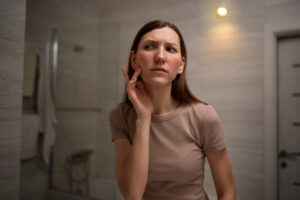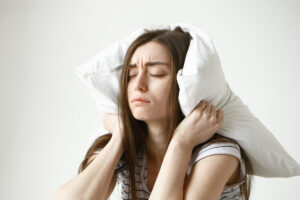Can electric leaf blower cause tinnitus?
As electric leaf blowers become more commonly used for yard work, many people have raised concerns about their potential impact on hearing health.
Tinnitus, the condition of hearing ringing, buzzing, or other sounds in the ears, is often linked to prolonged exposure to loud noises.
This article explores whether exposure to the noise from electric leaf blowers can contribute to tinnitus and what steps you can take to protect your ears from potential damage.
Can Electric Leaf Blower Cause Tinnitus?
Electric leaf blowers are commonly used in outdoor maintenance and cleaning tasks.
While they are more eco-friendly than gas-powered alternatives, they still generate considerable noise during operation.
The decibel level of electric leaf blowers can reach up to 100 decibels (dB), which is comparable to the noise level of a chainsaw or a jackhammer.
According to the CDC, noise exposure of 85 dB or higher for extended periods can lead to hearing damage, and the risk of developing tinnitus increases with the intensity and duration of exposure.
Tinnitus is often caused by noise-induced hearing loss, a condition that results from prolonged exposure to loud sounds that damage the delicate structures inside the ear.
Electric leaf blowers, depending on their decibel level and how long you’re exposed to the noise, could be a contributing factor to the development of tinnitus.
Safe Use of Electric Leaf Blower to Prevent Hearing Damage
There are several measures you can take to reduce your risk of hearing damage when using an electric leaf blower.
First and foremost, wearing ear protection is crucial.
High-quality earplugs or noise-canceling earmuffs can help reduce the decibel level that reaches your inner ear, significantly lowering the risk of hearing damage.
For optimal protection, look for ear protection rated to block noise levels of at least 25 dB or higher.
Limiting the time you spend in close proximity to the leaf blower is also important.
Try to take breaks and give your ears time to recover between periods of exposure.
Using the leaf blower in well-ventilated areas where the sound can dissipate more easily also helps reduce the risk.
Finally, ensure that you maintain your hearing health by regularly monitoring your hearing through check-ups with an audiologist.
Other Sources of Noise That Can Lead to Tinnitus
Electric leaf blowers are just one of many sources of loud noise that can contribute to tinnitus.
Other common sources of noise-induced hearing damage include:
- Concerts, especially those with amplified sound.
- Heavy machinery, such as jackhammers or construction equipment.
- Power tools, including lawnmowers, chainsaws, and drills.
- Motorcycles and loud vehicles.
- Fireworks and other loud outdoor events.
Prolonged exposure to noise from these sources can increase the risk of developing tinnitus, especially if you don’t take proper precautions.
When in environments with high noise levels, it’s essential to wear appropriate hearing protection and limit exposure whenever possible.
Signs of Tinnitus and When to Seek Help
Tinnitus manifests as ringing, buzzing, or hissing sounds that aren’t present in the external environment.
It can affect one or both ears and can vary in intensity, from a soft hum to a loud roar.
Common signs of tinnitus include:
- A continuous or intermittent ringing in the ears.
- Difficulty hearing in noisy environments.
- Feeling of fullness or pressure in the ear.
- Disturbed sleep or difficulty concentrating due to the noise.
If you notice these symptoms after exposure to loud noises like electric leaf blowers, it’s important to take them seriously.
While tinnitus may go away on its own after a short period of noise exposure, persistent or worsening symptoms should be evaluated by a healthcare professional.
Tinnitus can sometimes be a sign of underlying hearing loss, so early intervention is crucial to prevent further damage.
Natural Remedies and Treatments for Tinnitus
Although there is no known cure for tinnitus, there are natural remedies and treatments that can help manage the symptoms.
For many individuals, the severity of tinnitus can be reduced through lifestyle changes, such as reducing stress and avoiding further exposure to loud sounds.
Certain dietary supplements have also shown promise in supporting ear health and reducing tinnitus symptoms.
Sonus Complete is one such supplement designed to help alleviate tinnitus and support overall ear health.
Sonus Complete contains a blend of natural ingredients, including vitamins, minerals, and plant extracts, that work together to reduce inflammation and support healthy auditory function.
The ingredients in Sonus Complete, such as vitamin B12, ginkgo biloba, and hawthorn berry, have been traditionally used to improve circulation and protect the nerves responsible for hearing.
By promoting better blood flow to the inner ear and reducing oxidative stress, Sonus Complete may help reduce the ringing sounds associated with tinnitus.
If you’re experiencing tinnitus symptoms, incorporating Sonus Complete into your daily routine may offer a natural and effective way to support your ear health and alleviate the discomfort caused by tinnitus.
If you’ve noticed persistent ringing or buzzing in your ears after exposure to loud noises like electric leaf blowers, it’s important to take action.
Sonus Complete offers natural support for tinnitus relief and overall ear health.
Visit the official Sonus Complete website to learn more and take the first step toward clearer, calmer ears.









